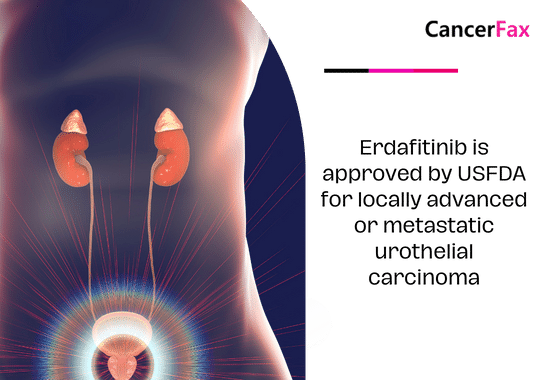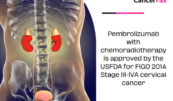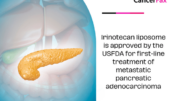Erdafitinib is approved by USFDA for locally advanced or metastatic urothelial carcinoma
Erdafitinib (Balversa, Janssen Biotech) was approved by the Food and Drug Administration on January 19, 2024, for adult patients with FGFR3 genetic changes who have locally advanced or metastatic urothelial carcinoma (mUC). Patients who have had their disease get worse after receiving at least one prior systemic therapy are eligible for this approval, according to an FDA-approved companion diagnostic test. Erdafitinib is not advised for treating patients who are eligible for and have not undergone prior PD-1 or PD-L1 inhibitor therapy. This approval changes the original use for people with metastatic urothelial carcinoma (mUC) who have certain mutations in the FGFR3 or FGFR2 genes and have already been treated with platinum-containing chemotherapy.
Study BLC3001 Cohort 1 looked at how well it worked. It was a randomized, open-label trial with 266 people who had metastatic urothelial carcinoma (mUC) and certain FGFR3 mutations. These patients had undergone 1-2 previous systemic therapies, which included a PD-1 or PD-L1 inhibitor. Participants were randomly assigned in a 1:1 ratio to either receive erdafitinib or the investigator’s preferred chemotherapy option, which could be docetaxel or vinflunine. Stratified randomization was conducted based on area, performance status, and the occurrence of visceral or bone metastases. In 75% of patients at a central laboratory, therascreen FGFR RGQ RT-PCR kit (Qiagen) detected FGFR3 mutations in tumor tissue, with the remaining patients having local next-generation sequencing studies find the mutations.
The primary efficacy measure was overall survival (OS). Investigator-evaluated progression-free survival (PFS) and objective response rate (ORR) were supplementary outcome metrics.
There were statistically significant improvements in overall survival (OS), progression-free survival (PFS), and objective response rate (ORR) when erdafitinib was used instead of chemotherapy. The median overall survival was 12.1 months (95% CI: 10.3, 16.4) for patients treated with erdafitinib and 7.8 months (95% CI: 6.5, 11.1) for those who received chemotherapy. The hazard ratio (HR) was 0.64 (95% CI: 0.47, 0.88) with a p-value of 0.0050. The median progression-free survival was 5.6 months (95% CI: 4.4, 5.7) for patients treated with erdafitinib and 2.7 months (95% CI: 1.8, 3.7) for those who received chemotherapy. The hazard ratio was 0.58 (95% CI: 0.44, 0.78) with a p-value of 0.0002. The confirmed objective response rate (ORR) was 35.3% (95% CI: 27.3, 43.9) for patients who were treated with erdafitinib and 8.5% (95% CI: 4.3, 14.6) for those who received chemotherapy (p-value<0.001).
The most frequent adverse reactions, occurring in more than 20% of cases, included elevated phosphate levels, nail issues, diarrhea, inflammation of the mouth, elevated alkaline phosphatase levels, reduced hemoglobin levels, elevated alanine aminotransferase levels, elevated aspartate aminotransferase levels, reduced sodium levels, increased creatinine levels, dry mouth, reduced phosphate levels, skin condition affecting the palms and soles, altered sense of taste, fatigue, dry skin, constipation, reduced appetite, increased calcium levels, hair loss, dry eyes, elevated potassium levels, and weight loss.
The suggested erdafitinib dosage is 8 mg taken orally once a day, with a potential increase to 9 mg once daily after 14 to 21 days depending on tolerability, particularly hyperphosphatemia. Continue treatment until disease worsens or side effects become intolerable.
Susan Hau is a distinguished researcher in the field of cancer cell therapy, with a particular focus on T cell-based approaches and cancer vaccines. Her work spans several innovative treatment modalities, including CAR T-cell therapy, TIL (Tumor-Infiltrating Lymphocyte) therapy, and NK (Natural Killer) cell therapy.
Hau's expertise lies in cancer cell biology, where she has made significant contributions to understanding the complex interactions between immune cells and tumors.
Her research aims to enhance the efficacy of immunotherapies by manipulating the tumor microenvironment and exploring novel ways to activate and direct immune responses against cancer cells.
Throughout her career, Hau has collaborated with leading professors and researchers in the field of cancer treatment, both in the United States and China.
These international experiences have broadened her perspective and contributed to her innovative approach to cancer therapy development.
Hau's work is particularly focused on addressing the challenges of treating advanced and metastatic cancers. She has been involved in clinical trials evaluating the safety and efficacy of various immunotherapy approaches, including the promising Gamma Delta T cell therapy.
- Comments Closed
- March 5th, 2024






Balversa for bladder cancer, Erdafitinib approval, FDA-approved targeted therapy, FGFR genetic alterations, FGFR inhibitor therapy, Locally advanced UC treatment, Metastatic urothelial carcinoma, Precision oncology 2024
CancerFax is the most trusted online platform dedicated to connecting individuals facing advanced-stage cancer with groundbreaking cell therapies.
Send your medical reports and get a free analysis.
🌟 Join us in the fight against cancer! 🌟
Привет,
CancerFax — это самая надежная онлайн-платформа, призванная предоставить людям, столкнувшимся с раком на поздних стадиях, доступ к революционным клеточным методам лечения.
Отправьте свои медицинские заключения и получите бесплатный анализ.
🌟 Присоединяйтесь к нам в борьбе с раком! 🌟